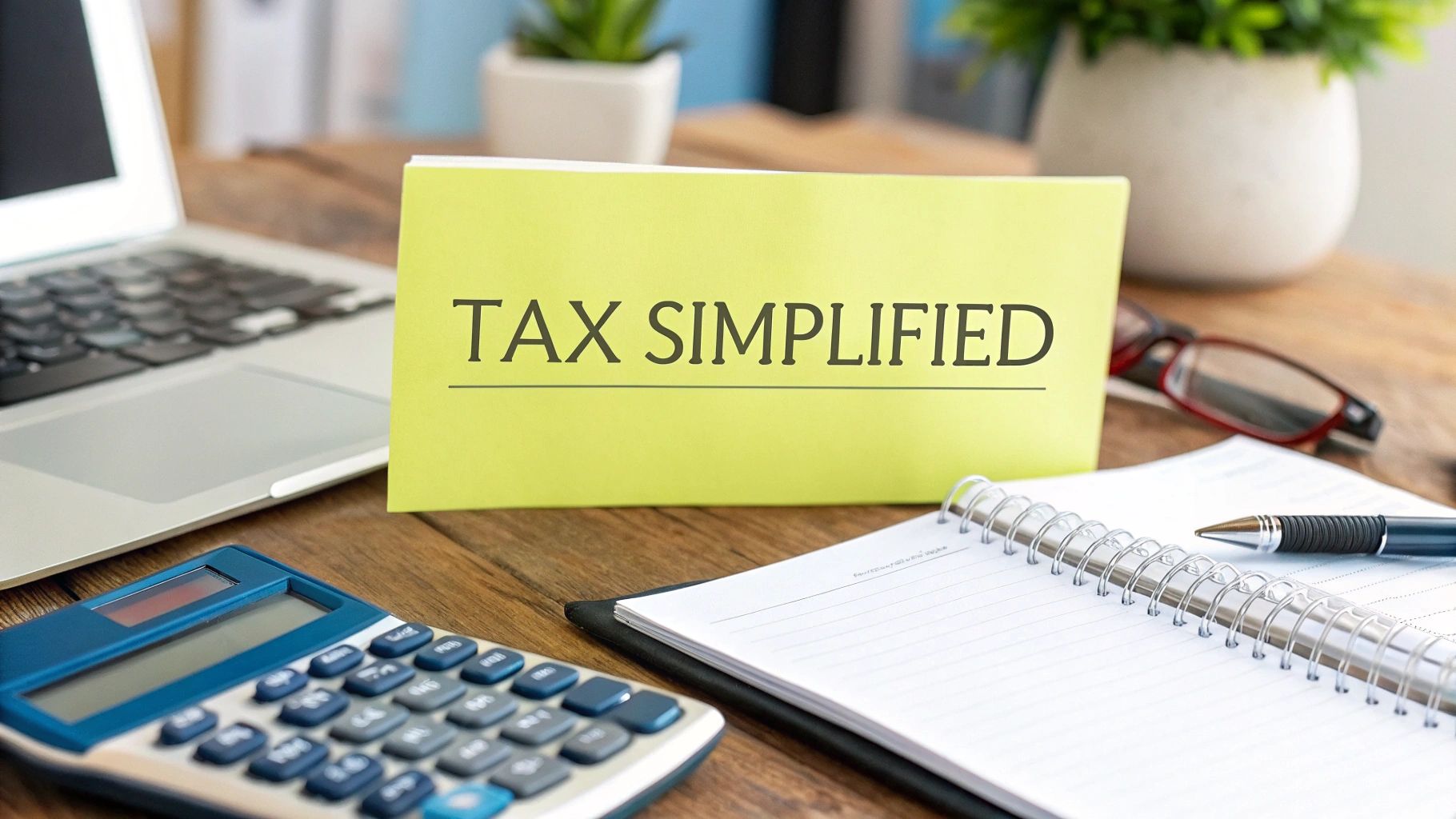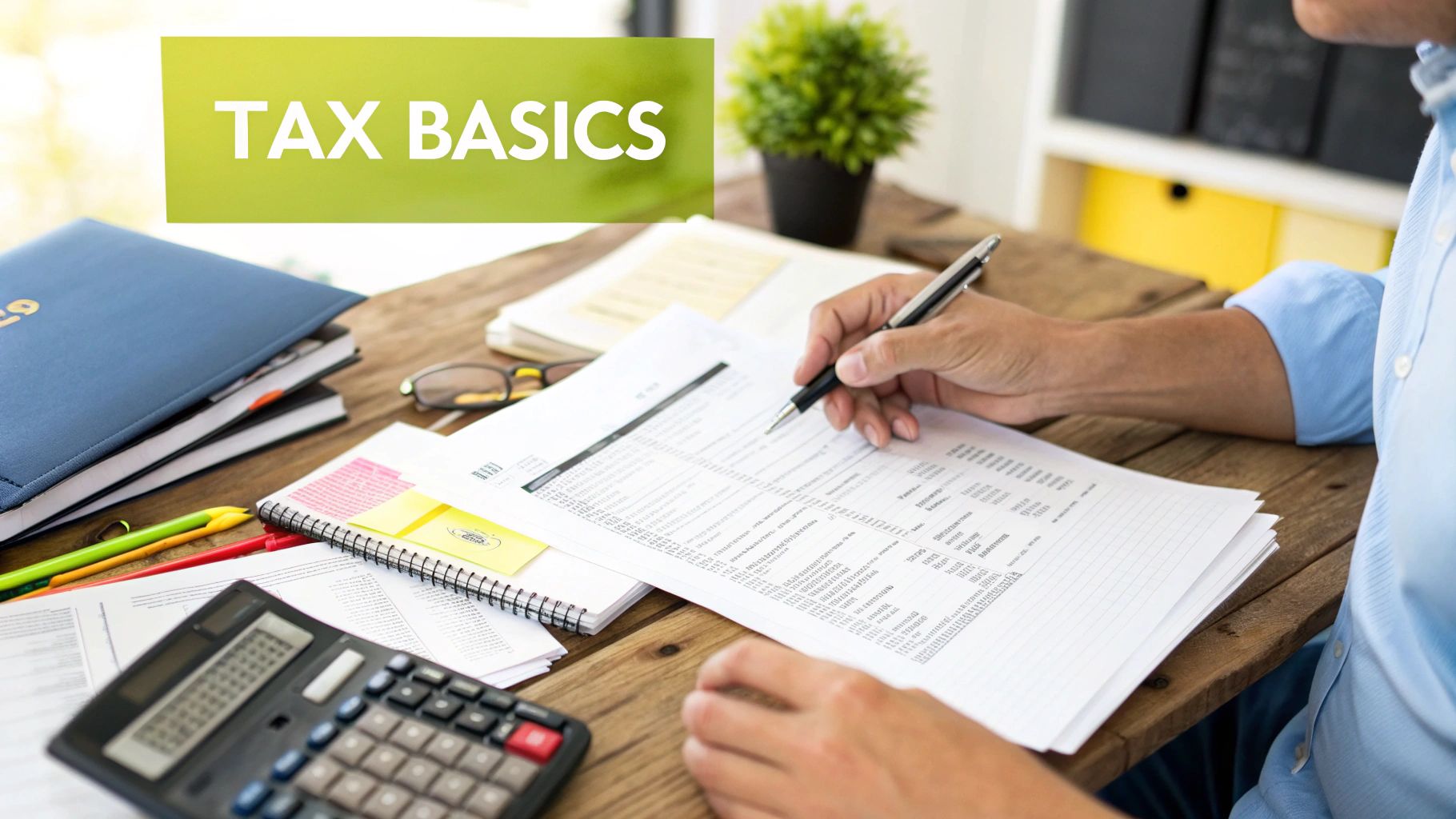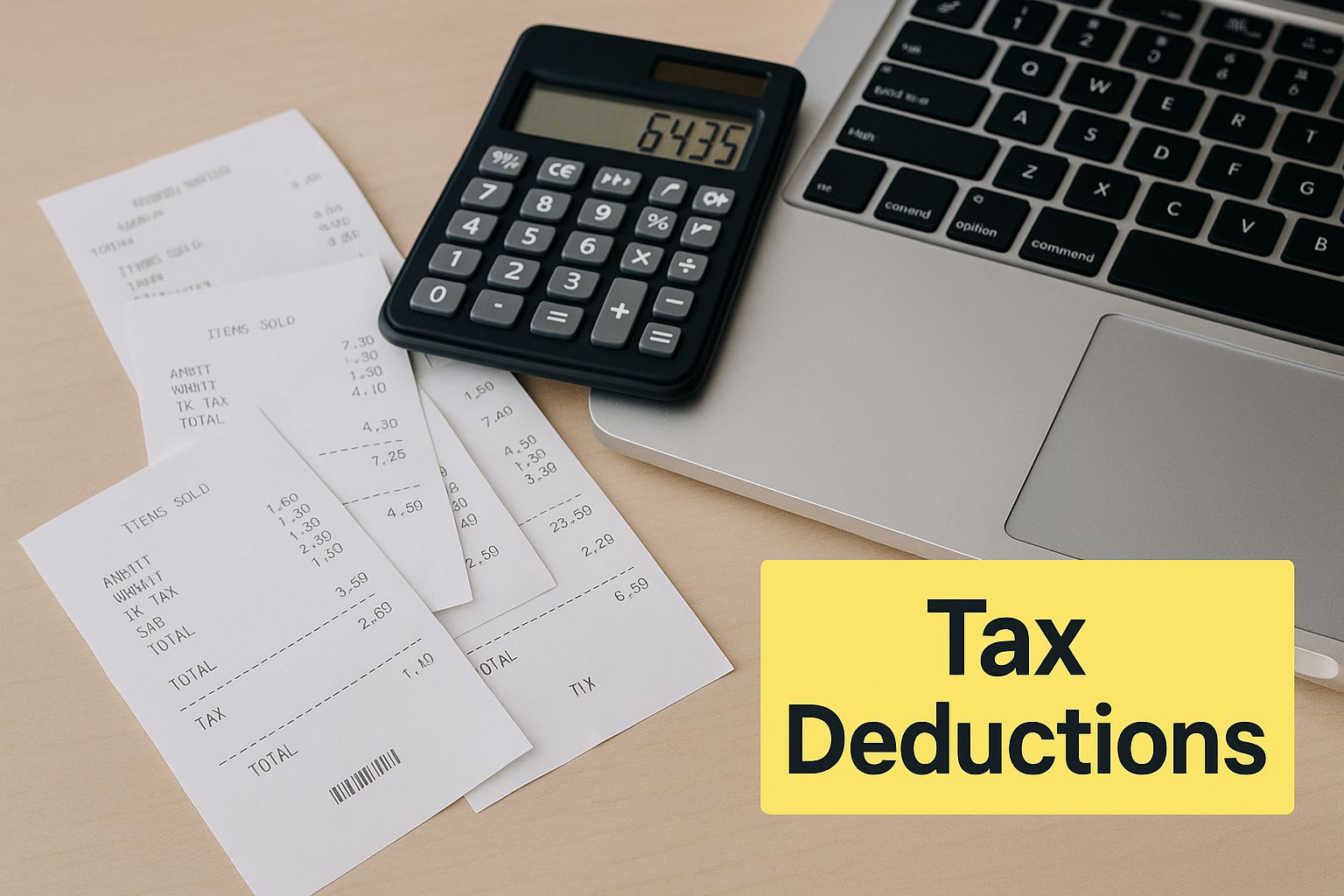
Let's be honest, for most entrepreneurs in the UK, the word "tax" brings on a cold sweat. It often feels like a complicated, time-consuming chore that gets in the way of actually running your business. But what if you started thinking about it differently?
The secret is to stop seeing tax as just a year-end headache and start treating it as a strategic part of your business plan. Good tax advice for small businesses isn't about scrambling to file on time; it's about proactive planning. It means choosing the right business structure from day one, diligently tracking every single allowable expense, and getting to grips with your duties for things like Corporation Tax, VAT, and National Insurance.

Think of managing your business taxes like navigating a ship. If you set sail without a map or any idea of the weather, you’re likely to run into storms (hello, HMRC penalties) or just get plain lost. But with a solid plan, you can steer clear of trouble and use the favourable winds (tax savings) to get where you’re going faster and safer.
This guide is your map. It’s here to give you the foundational tax advice you need to navigate the UK system with a bit more confidence.
The taxes you’ll face depend almost entirely on how your business is set up and how much it earns each year. The whole journey really starts with establishing your venture correctly, a process we break down in our complete guide on how to start a business in the UK.
Once you’re up and running, you'll come across a few main types of tax. It's crucial to understand which ones apply to you.
Here’s a quick rundown of the primary taxes you’ll likely need to manage. The specifics will hinge on your business structure and turnover, so think of this as your starting point.
Tax TypeWho Pays It?Key ConsiderationCorporation TaxLimited CompaniesPaid on annual profits after deducting expenses. The rate can vary, making expense tracking vital.VAT (Value Added Tax)Businesses with turnover above £90,000You must register, then charge VAT on sales and reclaim it on business purchases.Income Tax & National InsuranceSole Traders & PartnersPaid on business profits through your annual Self Assessment tax return.PAYE & Employer's NIBusinesses with employees (including directors)Deducted from employee salaries and paid to HMRC, along with employer contributions.
Getting professional advice is always a smart move to make sure you're ticking the right boxes for your unique situation.
“Managing tax isn’t just about paying what you owe; it’s about understanding the system to ensure you don’t overpay. The right advice transforms tax from a liability into a component of your financial strategy.”
Getting your tax wrong can hit your wallet hard. Official figures reveal that small businesses are a major source of the UK's "tax gap"—that's the difference between what HMRC is owed and what it actually collects. A huge chunk of this, around 40%, comes from unpaid Corporation Tax alone.
Worse still, HMRC data shows that simple "failure to take reasonable care" is behind nearly a third of all tax shortfalls from small businesses. This just goes to show how much of a difference good bookkeeping, understanding your duties, and filing on time can make. It’s not just about compliance; it’s a direct way to protect your business from hefty fines.
Proactive management and sound advice aren't just an expense—they're an essential investment in your company's financial health and long-term stability.
Getting to grips with every allowable business expense is one of the most effective ways to legally reduce your tax bill. It helps to think of it as a financial sieve. As income flows into your business, this sieve catches all the legitimate running costs, letting only the actual profit pass through to be taxed. The better you are at using this sieve, the less profit HMRC can take a slice of.
Most business owners are good at claiming the obvious stuff, like stock or office supplies, but so many miss out on a goldmine of other deductible expenses. The golden rule from HMRC is that an expense must be “wholly and exclusively” for business purposes. This is where having a savvy accountant or solid tax advice really pays off, helping you spot every chance to save.
Let's go beyond the basics like stationery and dig into some of the areas where small businesses often leave money on the table.
A big one is your home office. If you run your business from home, you’re entitled to claim a slice of your household running costs. This isn't just about a new printer. We're talking about a percentage of your utility bills (gas and electricity), council tax, and even your mortgage interest or rent. The trick is to work out a reasonable proportion based on how much of your home you use for business, and for how long.
For instance, if you have a five-room house and use one room purely as your office, you could make a case for claiming 20% of those household bills as a business expense. The alternative is HMRC's simplified flat rate, which gives you a fixed monthly amount based on the hours you work from home. It's definitely easier, but you’ll often get a smaller deduction than if you calculate the actual costs.
The goal is to ensure you pay the correct amount of tax, and not a penny more. Failing to claim every legitimate expense means you're voluntarily overpaying and putting your business at a disadvantage. It’s your money—make sure you keep what you're entitled to.
Next up, let's look at travel and subsistence. This is much more than just the fuel in your van. It can include:
The crucial point here is that the journey must be for business, not your regular commute. A web developer travelling to a client’s office can claim the mileage. Driving to their permanent office every single day? That doesn't count.
Spending money to grow your business and your own skills also comes with tax perks. Many owners don't realise that costs related to training and professional development are deductible, as long as the course improves skills you need for your current business. A graphic designer taking an advanced Photoshop course can claim the full cost. But you can't claim for training that helps you start a completely new, unrelated business.
Marketing and subscriptions are another rich source of deductions. Think bigger than just your advertising spend.
By carefully tracking every pound you spend to run and grow your business, you turn these expenses from simple costs into powerful tools for tax reduction. This proactive mindset is a cornerstone of smart financial management. Keeping detailed records isn't just about staying on the right side of HMRC; it's about empowering your business.
Picking a legal structure for your business is one of those foundational decisions that has massive knock-on effects, especially on your tax bill. Think of it like choosing the right vehicle for a journey. A sole tradership is like a nimble scooter – easy to get going, cheap to run, and perfect for simple trips. A limited company, on the other hand, is more like a sturdy van; it gives you far more protection and capacity but comes with more complex paperwork and higher running costs.
The right structure isn't just a box-ticking exercise. It directly dictates how you're taxed on your profits, how much personal risk you're exposed to if things go south, and the National Insurance you'll pay. Getting this choice right from the very beginning is one of the smartest things you can do and can save you a bundle in tax and headaches later on.
Kicking off as a sole trader is the most straightforward route into business. Legally, you and your business are one and the same. This means any profits you make are simply treated as your personal income.
You'll pay Income Tax on those profits through your annual Self Assessment tax return. You’re also on the hook for two types of National Insurance: Class 2 (a flat weekly rate) once your profits hit a certain level, and Class 4 on profits above another threshold. It's simple, but there's a catch: there's absolutely no separation between your personal and business finances.
This is where things get interesting. Setting up a limited company creates a completely separate legal entity. The company's finances are its own, and your personal assets—like your house or car—are shielded from business debts. This protection is the game-changer.
From a tax perspective, the company doesn't pay Income Tax. Instead, it pays Corporation Tax on its profits. To get money out for yourself, you have two main options: pay yourself a salary (which is a tax-deductible expense for the company) or issue dividends from the profits left over after tax.
This dual approach is often far more tax-efficient:
This infographic gives a clear view of how organising your finances can lead to smart deductions.

As the image shows, effective tax management is all about meticulous tracking. By categorising every single business expense correctly, you can make sure you're claiming every deduction you're entitled to.
The real power of a limited company lies in its tax flexibility. By carefully balancing salary and dividends, you can significantly lower your overall tax and National Insurance burden compared to being a sole trader with the same level of profit.
A business partnership works a lot like being a sole trader, but with two or more people involved. Every partner is treated as self-employed and pays Income Tax and National Insurance on their slice of the profits.
While they're simpler to run than a limited company, partnerships carry that same unlimited liability risk. If the business racks up debts, every partner is jointly responsible, and personal assets could be on the line. It's for this very reason that many successful partnerships eventually incorporate as a limited company to get that vital financial protection.
Many businesses start life as a sole tradership and then make the leap to a limited company as they grow. The signs that it’s time to switch are usually quite clear:
Changing your structure isn't something to do on a whim; it has its own tax implications. Getting the new company set up correctly and making sure all the paperwork is handled properly is vital. This is where getting professional support can be invaluable, especially for navigating the complexities of your final Self Assessment and first Corporation Tax returns. Aligning your business structure with your financial goals is a strategic move that pays dividends, quite literally, for years to come.
Great record-keeping is the absolute bedrock of sound tax management for any small business. It’s not just about keeping HMRC happy; it's about painting a clear, indisputable financial picture of your company. Think of your records as your business's 'black box' recorder—invaluable for navigating daily decisions and completely essential if you ever face an enquiry.
Far too many entrepreneurs get tripped up by disorganised finances. When you let record-keeping slide, you don't just risk serious penalties. You also miss out on claiming every single allowable expense you're entitled to. This creates a financial blind spot that can cost you dearly over time.
This lack of diligence has a real impact. Recent government estimates point to a national "tax gap" of £46.8 billion, with small businesses making up a huge chunk of that—around 60% of the total shortfall. A major driver is a simple "failure to take reasonable care," which, more often than not, comes down to poor records. You can dig deeper into these findings and the challenges small companies face with tax compliance.
HMRC isn't just suggesting you keep good records; it's a legal requirement. You need to keep detailed track of all your business's sales and income, alongside all your business expenses. These records are the foundation of your tax returns.
Here’s a quick rundown of the essential documents you need to have on file:
Keeping meticulous records isn't about getting buried in bureaucracy; it's about empowerment. An organised financial system gives you the clarity to make smart decisions, the evidence to lower your tax bill, and the peace of mind that comes with being fully compliant.
For most taxes, you’re required to keep your records for at least five years after the 31st of January submission deadline for that tax year. If you're running a limited company, that extends to six years from the end of your financial year.
The days of handing your accountant a shoebox full of crumpled receipts are well and truly numbered. HMRC’s Making Tax Digital (MTD) initiative is pushing businesses into a fully digital system. Right now, all VAT-registered businesses must use MTD-compatible software to keep digital records and file their VAT returns.
And it won't stop there. MTD for Income Tax Self Assessment (ITSA) is on the horizon for most sole traders and landlords. This means you will soon need to:
This isn't just change for the sake of it. The goal is to make tax administration more efficient and cut down on errors. Getting on board with digital tools now isn't just about future-proofing your business; it’s about making your life easier today. Modern accounting software can automate heaps of tasks, give you real-time financial insights, and make compliance a whole lot simpler. For many business owners, getting professional help is the key to a smooth transition, which is why our digital bookkeeping services are set up to take this entire process off your hands.
Even with the best of intentions, it's surprisingly easy to make mistakes that can land you in hot water with HMRC. Keep an eye out and steer clear of these common errors:

Getting your taxes right isn't about a frantic scramble before the filing deadline. Far from it. Smart tax management is a marathon, not a sprint—a year-round discipline that can save you a significant amount of money and stress.
When you start thinking proactively, you can make informed decisions that turn tax from a dreaded annual event into just another manageable part of your business plan.
Think of it this way: as your business earns money, a slice of that income never really belongs to you; it's earmarked for HMRC. The best habit you can get into is creating a separate ‘tax pot’. By siphoning off a percentage of your income into this pot regularly, you build up a reserve that’s ready and waiting for your tax bill.
This simple bit of housekeeping prevents the all-too-common cash flow panic that catches so many businesses out. When the tax payment is due, the money is already there, turning a potential financial shock into a routine payment.
For limited company directors, how you pay yourself is one of the most powerful tax planning tools you have. Instead of drawing a large salary, a savvy combination of a small salary topped up with dividend payments is almost always more efficient.
Why? Because dividends aren't subject to National Insurance contributions and are taxed at lower rates than salary income.
Getting this balance right requires careful calculation, but it’s a cornerstone of good tax advice for any small limited company. Keeping on top of your management accounts is vital here, as it allows you to track profits and ensure any dividends you pay out are legal and properly documented.
Capital allowances are a brilliant form of tax relief that lets you deduct the cost of major business assets from your profits before you calculate your tax. This covers big-ticket items like machinery, computers, equipment, and company vehicles.
Timing these purchases strategically can make a huge difference to your tax bill. For instance, the Annual Investment Allowance (AIA) lets most businesses write off 100% of the cost of qualifying assets in the year they buy them, up to a very generous limit.
By planning a large equipment purchase for just before your company’s year-end, you can slash your taxable profit for that year. This directly lowers your Corporation Tax bill. It’s not about spending for the sake of it, but about making necessary investments at the most financially opportune moment.
This kind of foresight gives your cash flow an immediate boost by reducing the tax you owe. Instead of waiting years to claim relief bit by bit, you get the full benefit upfront, which is a massive help when you've just made a large capital outlay.
Pension contributions are another fantastic, and often overlooked, tool in the tax planning box. When your limited company pays into your personal pension, that contribution is treated as an allowable business expense.
This means the full amount is deducted from the company's profits, directly reducing its Corporation Tax liability. Better yet, the contribution isn't a personal benefit-in-kind, so you don't pay a penny of income tax or National Insurance on it.
It’s a genuinely powerful way to pull profits from your company tax-efficiently. You're simultaneously cutting the company's tax bill and building your personal wealth for retirement. This is a perfect example of how integrated financial planning benefits both you and your business in the long run.
Knowing when to call for backup is a sign of a smart business owner, not a weakness. While you might get by with a DIY approach in the very early days, there are definite trigger points when professional tax advice stops being a nice-to-have and becomes an absolute necessity.
Think of it like this: you could probably navigate a tricky mountain trail with just a map. But an experienced guide knows the terrain intimately—the hidden shortcuts, the safest paths, and the dangerous pitfalls you’d never spot on your own. Investing in an expert is the same; they can steer you away from costly mistakes and uncover savings you would have otherwise missed.
Certain business milestones throw a spanner in the works, making your finances far more complicated. Trying to muddle through these situations alone is a recipe for errors, missed opportunities, and serious compliance headaches. It’s time to get an expert on the phone when you are:
The UK’s tax system is notoriously complex, and it’s a huge challenge for small businesses. In fact, data shows a growing compliance problem, with about 40% of tax owed by small enterprises going unpaid each year. This isn't usually deliberate—it just shows how easy it is to make unintentional mistakes and why reliable support is so vital. You can read more about the growing UK small business tax gap and its causes.
The right adviser does more than just fill in your tax return once a year. They become a strategic partner who genuinely understands your business and your goals, offering both basic compliance and high-level planning.
For many entrepreneurs, especially in the early stages, getting specific guidance is key. You can explore our dedicated tax advice for sole traders to see how tailored support can simplify your financial life. Ultimately, an expert saves you time, reduces your tax bill, and frees you up to focus on what you do best—running your business.
When you're running a small business, it feels like the tax questions never stop piling up. Getting your head around the UK tax system is a big part of the journey, and finding clear, simple answers is the key to feeling in control. Let's tackle some of the most common queries that land on our desks.
This is probably one of the most important distinctions every business owner needs to get right. Honestly, it's the difference between being smart and breaking the law.
Think of it this way: tax avoidance is like playing a board game and using all the official rules to your advantage. You're using legal strategies, allowances, and reliefs that HMRC provides—things like claiming every allowable expense you're entitled to or making pension contributions. It’s all above board.
Tax evasion, on the other hand, is cheating. It’s deliberately hiding income or making things up to illegally reduce your tax bill. We're talking about not declaring cash-in-hand jobs or inventing expenses that never happened. While avoidance is just good planning, evasion can land you in serious hot water, with huge penalties and even criminal charges.
Making Tax Digital, or MTD, is HMRC's big push to bring the tax system into the 21st century. If you're a sole trader or landlord with income over a certain amount, MTD for Income Tax Self Assessment (ITSA) is heading your way.
So, what does this actually mean for you? Soon, you'll need to:
The best thing you can do is get ahead of the curve. Start looking at digital tools now. The whole point of this shift is to make tax reporting more accurate and cut down on simple mistakes in the long run.
Yes, absolutely! This is one that many new business owners miss. HMRC lets you claim for many allowable business costs you paid for up to seven years before you officially opened your doors. These are known as pre-trading expenses.
The golden rule here is that the expense must be something you could have claimed if your business was already up and running. Think of things like buying your initial stock, paying for market research, or the costs of building your first website. All of these would typically count.
Most tax return errors aren't complex; they usually come down to a handful of common slip-ups. Knowing what they are is half the battle in avoiding them yourself.
The usual suspects are messy record-keeping, trying to claim personal spending as a business expense, and, of course, missing the deadlines for filing or paying. These classic pitfalls just go to show that the best tax advice is often the simplest: stay organised, be honest, and be on time.
Need an expert to help you navigate these questions and more? GenTax Accountants offers clear, proactive tax advice to keep you compliant and help your business grow. See how our online accounting services can make your life easier.